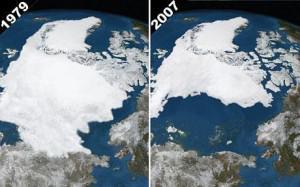 Recently, I watched a presentation from former Vice President Al Gore on TED.com about climate change (embedded below). Though the video is short, I found myself feeling somewhat annoyed with the presentation. Gore spent most of the 8 minute presentation showing pictures of shrinking ice caps, melting glaciers, and other graphics showing presumably indisputable signs of climate change. I had to think to myself, why was I becoming annoyed? Basically, I was tired of being pummeled with the “facts;” proof that climate change was occurring, with all the scary satellite imagery and GIS maps to prove it.
Recently, I watched a presentation from former Vice President Al Gore on TED.com about climate change (embedded below). Though the video is short, I found myself feeling somewhat annoyed with the presentation. Gore spent most of the 8 minute presentation showing pictures of shrinking ice caps, melting glaciers, and other graphics showing presumably indisputable signs of climate change. I had to think to myself, why was I becoming annoyed? Basically, I was tired of being pummeled with the “facts;” proof that climate change was occurring, with all the scary satellite imagery and GIS maps to prove it.
Anyone with a year or two of college understands the importance of appealing to your audience. If Gore were speaking to a room full of climate scientists, he may have made different arguments than simply showing maps and graphics that the climate scientists themselves may actually have produced. So for a TED presentation, I understand the importance to appealing to the very-general public, which for Gore appeared to mean using scare tactics to make his audience afraid of climate change. By scaring people with climate change photos and charts, perhaps Gore feels he can bring about some action.
As a recently graduated environmental science student, I sat through many classes that focus on climate processes, and how climate change will affect these processes. So for me, seeing satellite images and charts is old news – I’ve already seen them. Diving into the climate change discussion further would seem to be more beneficial for me than just trying to prove climate change exists. I’m not so self-centered that I don’t realize that many people around the world are still unaware of climate change, but I wonder if perhaps we have reached a point where enough people know about the basics of climate change that we now have to step up the content of the arguments. Does the vast general public know enough about the basics of climate change that we need to start talking about more complex issues related to it?
Just a few weeks ago, the Waldo Canyon Fire burning next to (and in some place inside) Colorado Springs was the top priority for firefighters in the United States. Living in Colorado, many of my friends from the Colorado Springs area posted pictures and first-hand accounts of the fire on Facebook. Some of the pictures looked dire, and as if hell had swallowed the mountains West of Colorado. One particularly concerning picture drew a response from a friend of mine, stating that these dramatic pictures of the fire were “getting out of hand,” seemingly claiming that the pictures of the fire were unnecessary. This comment obviously drew a lot of criticism, but I couldn’t help but wonder about the reason for this comment. On the one hand, it can be argued that these pictures of the fires were causing stress, and this stress was getting in the way with, say, lounging by the pool and having a carefree weekend while enjoying beers and mixed drinks. On the other hand, perhaps my friend was making the point that, “yes, I understand there is a devastating fire in Southern Colorado, there isn’t much I can do about it, and causing me stress and concern isn’t going to help the situation.” Perhaps this can be related to the climate change argument.
Perhaps the facts of climate change have been drilled into people so much that they are tired of hearing it. I know of people going on so-called “news diets” because they are tired of hearing all the bad news coming through the media. If people are choosing to ignore climate change because it is making them depressed, then obviously the fight is being lost. There needs to be a new marketing approach to “selling” climate change prevention to the general public.
As has been reported both on 2ndgreenrevolution.com and elsewhere, more attention needs to be given to appealing to people’s wallets, not their hearts. Climate change is too large of an issue, and too detached from people’s regular everyday experiences to expect that striking fear from impending doom will bring needed changes in policies and mentalities. Directly causing joy or disappointment in someone’s life will cause reactions. This is why people (generally) don’t speed or park in handicap parking spots for fear of monetary punishment in the way of tickets. You are much more likely to find immediate fear in someone at the sight of a police car as opposed to the sight of rising average global temperatures.
Therefore, rather than continuing to bombard the public with the results of climate change, we need to make life comfortable (or uncomfortable) for people depending on their everyday practices. High gas prices caused a lot of Americans to sell their gas-guzzlers in favor of more efficient vehicles. Rather than these actions happening by accident, we need to start making these kinds of actions more attractive on purpose.

